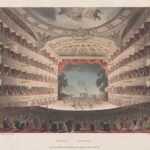Announcing the winner of the 2023 Restless Books Prize for New Immigrant Writing.
Literary Hub is pleased to announce the winner of the Restless Books Prize for New Immigrant Writing, which each year awards $10,000 and publication to a first-time, first-generation immigrant author, alternating yearly between fiction and nonfiction. The 2023 nonfiction prize goes to Catharina Coenen for a collection of essays, Unexploded Ordnance, which will be published by Restless Books in 2025. This year’s prize was judged by Grace Talusan, Jiaming Tang, and Ilan Stavans.
Catharina Coenen is a first-generation German immigrant to Pennsylvania, where she teaches biology at Allegheny College. Her essays have been nominated for the Pushcart Prize and have appeared on the Best American Essays Notable list as well as in literary magazines such as The Threepenny Review, The American Scholar, The Christian Science Monitor, and Best of the Net. Catharina is the recipient of creative nonfiction prizes from the Appalachian Review and from The Forge, a Creative Nonfiction Foundation Science as Story Fellowship, and a Hedgebrook Residency.
About Unexploded Ordnance—the judges’ citation:
What happens to the body after trauma? To the bodies of those descended from trauma? What becomes of desire that has been subsumed?
These are the questions that arise from this staggering collection of essays, one that brilliantly examines the legacy and inheritance of trauma in three generations of German women. The hurts and silences, ambitions and dignities of grandmothers, aunts, mothers, and daughters take center-stage, giving voice to a range of experiences that feel both timely and timeless. As Coenen reflects on how she came to her own queer identity, she does not shrink from examining her family’s past, sharing stories that implicate the suffering caused by her grandparents’ Nazi ties as a powerful act against secret-keeping.
Unexploded Ordnance invites the reader to think, perhaps for the first time, about the intersection of science, immigration, choice, and memory. Coenen’s perspective as a biologist informs how she brings the personal and political together, allowing the reader to see as a scientist, but through an artist’s gaze. And yet, beneath the strength of her voice—frank, tender, wise—there is a way in which her expertise disappears into the work itself.
Coenen also challenges our perception of what nonfiction can be. Her approach shows both an urgency and a formal inventiveness. No two essays feel the same, and yet there is a powerful sense of cohesion in the reading experience, as well as a sense of awe—the essays are themselves small grenades thrown against walls of silence, denial, and shame. If it is the duty of the scientist to explore the natural world, Coenen does it beautifully by turning her focus to our most basic makeup: the stories we carry in our genes. We are all beneficiaries of her courage and determination.
—Prize Judges Grace Talusan, Jiaming Tang, and Ilan Stavans
Catharina Coenen on her winning memoir:
When I first moved to the U.S. from Germany for graduate school in botany, I was shocked by the ease with which many Americans joked about “Nazis.” Yet I could not explain that the word shook me to the core—claiming space for my emotions or for my family history felt inconceivable in the face of the suffering that my grandparents’ generation had caused.
Ten years ago, I took my first creative nonfiction class. I meant to write about plants, but every piece I wrote twisted itself into stories about my mother’s and grandmother’s experiences during World War II. The linked essays in Unexploded Ordnance examine how fascism, genocide, silence, and the bombs of World War II shaped three generations of women in my Catholic-German family and my life as a queer, first-generation immigrant.
Growing up in a country that started two world wars and was responsible for the Holocaust, I learned about Hitler and the concentration camps in school. But I never questioned why I woke up screaming from nightmares of fires and of trains, or why my teenage friends’ interest in boys struck me as odd. My mother was five at the end of the war. When I was young, she never talked about hiding in basements while bombs shook the walls, or about fleeing burnt-out cities in overcrowded trains, stuffed in the baggage net above her mother’s head. She never mentioned her months in an orphanage, or hiding her mother under the baby’s crib during the mass rapes committed by invading French soldiers across southern Germany. Decades after I moved to America, I fell in love with a woman. Amid the wreckage of my marriage, I remembered the wartime anecdotes my grandmother had dropped into my childhood like small grenades. I began to question my mother about her memories, and to tie them to what I had learned in school. Writing helped me to understand the link between my grandmother’s denial of my aunt’s mental illness and Nazi killings of disabled children in the first gas chambers. I learned how threats to disabled people, gay people, Jewish people, political dissidents, anyone labeled as “different,” had bent my life. Those threats persist, across borders, to this day.
To write and to publish has become my way to fulfill a promise I gave when I first entered the U.S. as a Fulbright student in 1989: to help nations understand each other, so they may live in peace.
Read an excerpt from Unexploded Ordnance in The Common.





